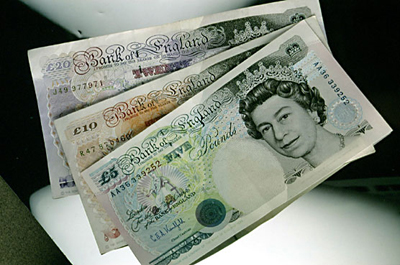Thursday, 02 July 2015 19:39
 LONDON: Sterling recovered from two-week lows against the dollar on Thursday, after a softer-than-expected US jobs report weighed on the greenback while a robust survey on UK construction sector underpinned the pound.
LONDON: Sterling recovered from two-week lows against the dollar on Thursday, after a softer-than-expected US jobs report weighed on the greenback while a robust survey on UK construction sector underpinned the pound.
US nonfarm payrolls increased 223,000 last month, the Labor Department said, falling short of expectations.
Adding to the report’s soft note, April and May data was revised to show 60,000 fewer jobs were added than previously reported. In addition, average hourly earnings were unchanged, taking the year-on-year increase to a tepid 2.0 percent and lowering bets that the Federal Reserve would increase interest rates this year.
Sterling rose to a day’s high of $ 1.5640 immediately after the US jobs data was released from around $ 1.5569, and off a two-week low of $ 1.5562 struck earlier in the day.
The euro was 0.4 percent higher against the pound at 71.04 pence.
“We are seeing some moderate selling in the dollar, post the jobs data which helping the euro and the pound,” said a London based spot trader.
Earlier in the day, better-than-expected British construction data helped the pound. At 58.1 points versus a forecast 56.5, the PMI survey showed construction activity in Britain grew at its fastest rate in four months in June, and confidence in the sector surged to an 11-year high after a lull in the run-up to May’s national election.
That was reflective of a UK economy that continues to outstrip its peers in Europe on the back of robust domestic demand and putting rises in interest rates back on the table for the end of this year. “Following the soft manufacturing PMI on Wednesday, the positive surprise eased concerns over growth in the second quarter and strengthened sterling somewhat,” said Sakis Paraskevov, analyst at IronFX Global.
“The services sector PMI, to be released on Friday, will shed further light on the likelihood of a rebound in the second quarter.”
Despite, the bounce in the construction sector, risks to the economy lurk in the form of a potential Greek exit. In the short run, though, ructions in the euro zone could encourage safe-haven inflows into Britain.
“We certainly like sterling on a medium term basis,” said Sam Lynton-Brown, a strategist with BNP Paribas in London. “We’re quite cautious in the short term because our indicators of short-term fair value suggest it should be lower at around $ 1.54. So we do see value in the medium term but until we see a correction lower, we are reluctant to get into the position.”
British long-dated gilt futures pared losses after the US jobs data, and were last at 115.10, down 3 ticks on the day.



























